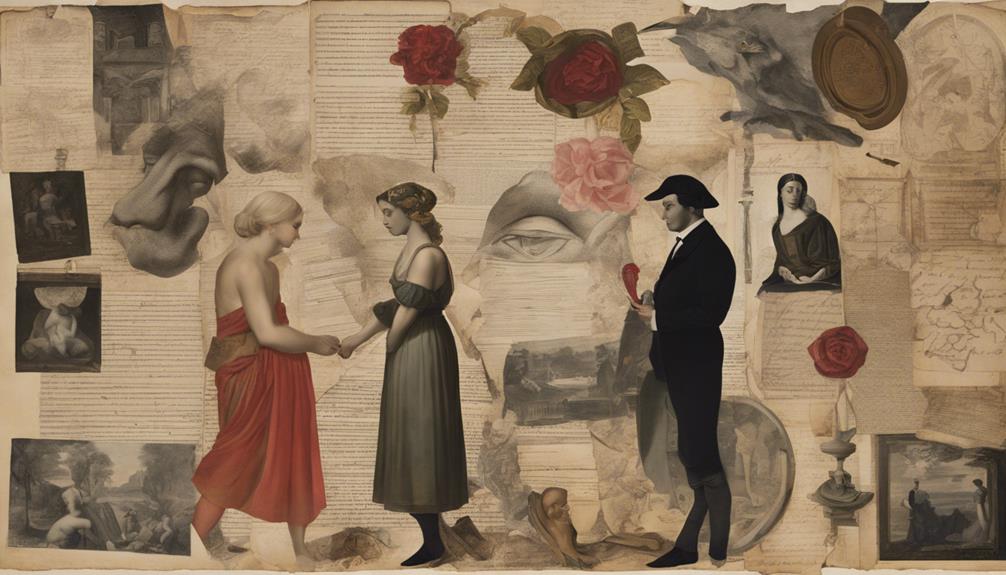When exploring cultural perspectives on marital infidelity, you'll find a rich blend of beliefs and norms that vary across time and societies. Some cultures may view infidelity as a private matter, while others see it as a severe betrayal. Historical contexts reveal that powerful men in ancient societies often faced no consequences for affairs, while women were harshly judged. Today, evolving gender roles and religious influences play significant roles in shaping attitudes. These dynamics create emotional turmoil, impacting relationships deeply. Understanding these complex layers can lead you to a broader insight into the societal implications of infidelity.
Historical Context of Infidelity

Throughout history, infidelity has woven itself into the fabric of human relationships, reflecting the evolving norms and values of different cultures and eras. You'll notice that what's considered acceptable or taboo has shifted dramatically over time.
In ancient societies, for instance, powerful men often enjoyed the liberty of extramarital affairs, while women faced severe repercussions for the same actions. This disparity highlights how societal norms can dictate behavior, often to the detriment of personal integrity.
As you explore various cultures, you'll see how infidelity has been both condemned and accepted, shaped by local customs. In some societies, infidelity was merely a reflection of virility or status, while others strictly enforced fidelity as a cornerstone of marriage. Cultural taboos surrounding infidelity can stifle open communication about desires and expectations within relationships.
In modern times, the conversation around infidelity continues to evolve, influenced by changing gender roles and the rise of individualism. The way people view infidelity today is often less about rigid societal norms and more about personal choice, leading to a complex landscape of relationships that challenges traditional boundaries.
Religious Influences on Infidelity
Religious beliefs considerably shape perceptions of infidelity, offering guidelines that often dictate moral behavior and influence societal attitudes toward marriage and fidelity. When you explore various faith-based teachings, you notice a common thread: fidelity isn't just a personal choice but a divine commandment. Many religions emphasize the sanctity of marriage and frame infidelity as a betrayal not just to a partner, but to a higher power.
As you observe different cultures, the impact of these teachings becomes clear. In some communities, infidelity can lead to severe repercussions, socially and spiritually. You might find individuals grappling with moral conflicts, torn between their desires and their faith. This struggle often leads to shame and secrecy, as they maneuver through the complexities of love, lust, and loyalty.
Faith-based teachings often provide a roadmap for steering through these turbulent waters, but they can also create pressure. The fear of judgment from both religious leaders and peers can amplify feelings of guilt, making it difficult for individuals to reconcile their actions with their beliefs.
Ultimately, understanding the role of religion in shaping views on infidelity reveals the intricate dance between personal desires and communal expectations.
Gender Roles and Expectations

Gender roles and expectations greatly influence how infidelity is perceived and experienced, often dictating acceptable behaviors for men and women within a relationship.
You might notice that societal norms often create a double standard when it comes to infidelity. For men, having an affair can sometimes be brushed off as a sign of virility, while women are often shamed or judged harshly for the same actions. These gender expectations shape not only how individuals view themselves but also how they interpret their partner's behavior.
As you navigate relationships, you may find that these entrenched norms pressure you to conform to specific roles. For instance, the expectation that men should be emotionally stoic can lead to a reluctance to discuss feelings of dissatisfaction, potentially fostering infidelity as a misguided outlet.
Conversely, women might feel compelled to maintain the facade of a perfect relationship, even when their needs aren't being met. This disparity creates a complex web of emotions and motivations surrounding infidelity, making it essential to understand how deeply rooted gender expectations and societal norms can influence your actions and responses in such situations.
Cultural Attitudes Toward Cheating
Cultural attitudes toward cheating vary markedly across societies, often shaped by historical, social, and economic factors that influence how infidelity is viewed and addressed.
In some cultures, infidelity might be tolerated or even overlooked, reflecting a broader acceptance of extramarital relationships as long as they don't disrupt family unity. You might notice how certain cultural norms position infidelity as a personal affair, where the emotional fallout is managed privately, thereby sidestepping societal scrutiny.
In contrast, other cultures impose strict societal expectations against cheating, deeming it a significant breach of trust that can lead to severe repercussions. Here, you can sense the weight of collective judgment; infidelity isn't just a personal failure but a societal one, impacting families and communities alike.
In these contexts, discussions surrounding marital infidelity become intertwined with moral values, reinforcing the idea that loyalty is paramount. You may find that individuals often navigate these cultural landscapes with caution, aware that their actions reflect not just personal choices but also the prevailing cultural norms that dictate acceptable behavior.
Legal Implications of Infidelity

Infidelity often carries significant legal implications, influencing divorce proceedings and custody battles in ways that can deeply affect the lives of those involved. When a partner strays, the fallout often extends beyond broken trust to legal ramifications that may determine one's financial future and parental rights.
In many jurisdictions, infidelity can complicate divorce proceedings, potentially impacting alimony disputes. You might find that the cheating spouse could be required to pay more in alimony if the court views their actions as a breach of the marital contract.
In some cases, marital contracts include fidelity clauses, which explicitly outline expectations around fidelity and can have legal weight. If you or your spouse has signed such a contract, infidelity may lead to significant financial penalties or the forfeiture of certain rights.
Furthermore, during custody battles, a judge may consider infidelity when evaluating the best interests of any children involved, viewing the moral character of each parent.
Thus, understanding the legal implications of infidelity is vital, as it can shape not just your relationship but also your financial and parental future in profound ways.
Psychological Perspectives on Betrayal
Betrayal can trigger a complex web of emotional responses, reshaping how individuals perceive trust and intimacy in their relationships. When you experience betrayal, the emotional impact can be profound and often overwhelming. You may feel a rush of anger, sadness, and confusion, grappling with the reality that someone you trusted has violated that bond. As these feelings swirl within you, the sense of security that once defined your relationship begins to crumble.
The erosion of trust is a slow, painful process. It doesn't just affect your partnership; it seeps into your overall worldview. You might find yourself questioning the intentions of others, fearing that vulnerability will lead to more betrayal. This suspicion can isolate you, creating a barrier between you and those who've done nothing wrong.
As you navigate these turbulent emotions, it's crucial to acknowledge the complexity of your feelings. Understanding the psychological perspectives on betrayal can help you process your experiences, ultimately guiding you toward healing. By confronting the emotional impact of betrayal, you can begin to rebuild trust, not just in others but also within yourself.
Modern Trends in Relationships

In today's fast-paced world, relationships often evolve rapidly, reflecting shifting societal norms and values that challenge traditional notions of commitment and connection.
You might notice that more couples are exploring open relationships, where boundaries blur and the idea of exclusivity is redefined. This trend often stems from a desire for freedom, honesty, and a deeper understanding of one's own needs and desires.
Social media plays a significant role in this evolution. Platforms like Instagram and Tinder not only facilitate connections but also influence how you perceive intimacy and commitment. You see curated images of couples embracing non-traditional arrangements, which can make open relationships seem appealing and accessible. The constant exposure to diverse relationship models pushes you to question monogamy and consider alternatives.
As you navigate these modern trends, it's crucial to communicate openly with your partner about expectations and boundaries. The line between emotional and physical connections can become blurred in this landscape, leading to both opportunities and challenges.
Ultimately, embracing these changes requires introspection, honesty, and a willingness to redefine what love and fidelity mean in your life.
Conclusion
In exploring cultural perspectives on marital infidelity, you uncover a rich tapestry of beliefs and practices.
From historical roots to modern trends, you see how religion, gender roles, and societal norms shape attitudes toward cheating.
The weight of psychological impacts and legal repercussions also becomes clear.
As you navigate these complexities, it's evident that infidelity isn't just a personal betrayal; it's a phenomenon deeply intertwined with the fabric of culture and human relationships.
